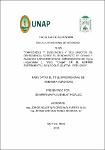Variedades y densidades y sus efectos de dependencia sobre el rendimiento de grano y algunas características agronómicas en Vigna unguiculata L. Walp. "caupí" en el centro experimental San Roque, Iquitos - Perú 2019
Abstract
The study was carried out at the "San Roque" Experimental Station, which belongs to the National Institute of Agrarian Innovation - INIA Loreto, is characterized by having a high terrace and slightly acidic soil. Which was based on determining the effects of varieties and planting densities on grain yield and morpho-agronomic characteristics in Vigna unguiculata L. Walp. "Cowpea". The ANVA for grain yield found a high statistically significant difference for the sources of variation (density and varieties) and no statistical significance for the interaction between varieties and densities. The highest yield was for the Castilla variety (V3) with 2.36 t/ha, for densities; for grains, a higher grain yield was obtained, with 187,500 plants/ha (D3) with 2.53 t/ha, the same interaction with the highest yield was for the Castilla variety. For plant height, there is no significant statistical difference between the means studied. For the pod length, the San Roque variety reaches a value of 19.74 cm (highest value), in the interaction, this variety planted at 150,000 plants / ha, highlights the highest value of 20.68 cm, observing statistical difference. With respect to the width of the San Roque variety pods with 0.99 cm, it was the most decisive, the same one that was statistically significant compared to the other varieties. For the weight of 100 grains, there is no statistical difference, for the study averages. For the number of pod grains, there is a high statistically significant difference for varieties, San Roque achieved 17.55 (highest value), in the variety interaction, San Roque (density 125,000 plants/ha) obtained 17.97 grains per pod. El estudio se realizó en la Estación Experimental “San Roque”, que pertenece al Instituto Nacional de Innovación Agraria - INIA Loreto, se caracteriza por ser de terraza alta y suelo ligeramente ácido. El cual se basó en determinar qué efectos ejercen las variedades y densidades de siembra en el rendimiento de grano y las características morfo agronómicas en Vigna unguiculata L. Walp. “Caupí”.
El ANVA para el rendimiento de grano, encontró alta diferencia estadística significativa para las fuentes de variación (densidad y variedades) y ausencia de significación estadística para la interacción variedades con densidades. El mayor rendimiento fue para la variedad Castilla (V3) con 2.36 t/ha, para densidades; para granos se obtuvo mayor rendimiento de grano, con 187,500 plantas/ha (D3) con 2,53 t/ha, igual la interacción al mayor rendimiento fue para variedad Castilla. Para altura de planta, no existe diferencia estadística significativa entre las medias estudiadas.
Para el largo de vaina, la variedad San Roque, alcanza un valor de 19.74 cm (mayor valor), en la interacción, esta variedad sembrada a 150,000 plantas /ha, resalta el mayor valor de 20.68 cm, observándose diferencia estadística. Con respecto al ancho de vainas variedad San Roque con 0.99 cm, fue la más determinante, la misma que fue estadísticamente significativa comparados con las demás variedades. Para el peso de 100 granos, no existe diferencia estadística, para los promedios del estudio. Para número de granos de vainas, hay alta diferencia estadística significativa para variedades, San Roque logró 17.55 (mayor valor), en la interacción variedad, San Roque (densidad 125 000 plantas/ha) obtuvo 17.97 granos por vaina.
Collections
- Tesis [675]


